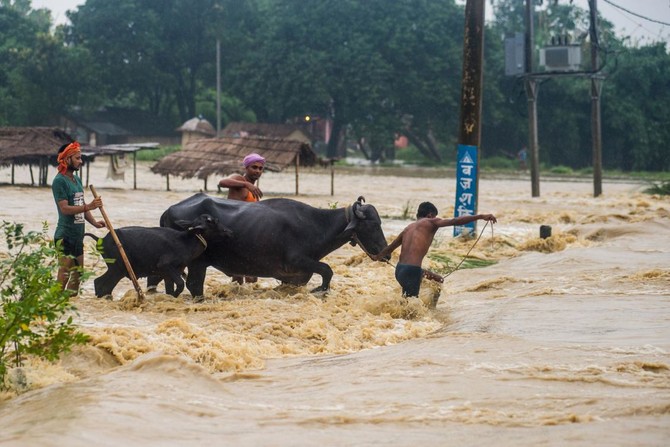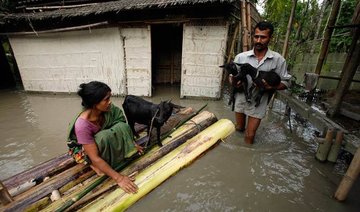KATMANDU: Monsoon floods and landslides have killed at least 94 people across Nepal and India but officials fear that figure could rise sharply as rescuers search for dozens believed lost under mud and in submerged villages.
Authorities Sunday upgraded the death toll from flash flooding across landlocked Nepal to 49 as the water kept rising, forcing thousands to flee for higher ground.
“Another 17 are missing. Search and rescue works are underway but the water levels have not declined yet,” said Shankar Hari Acharya, the chief of Nepal’s national emergency center.
The Red Cross estimated a higher death toll of 53, with dozens more missing and injured, and thousands of homes destroyed.
In neighboring India, a massive landslide in the mountainous north swept two passenger buses off a hillside and into a deep gorge, killing 45 people, an official said.
The coaches had stopped for a tea break around midnight Saturday in Himachal Pradesh when tons of rock and mud cascaded down a mountainside.
Forty-five bodies have been recovered from the accident site in the Himalayan state, said Sandeep Kadam, a senior official at the scene, late Sunday.
But more were still missing somewhere at the bottom of the ravine, with soldiers and rescuers working into the night to reach those beneath the mud and rock.
“Around 200 meters of national highway washed away with two buses and more than 50 feared buried,” said Indian army spokesman Col. Aman Anand, who was helping coordinate rescue efforts.
Monsoon season
Indian Prime Minister Narendra Modi extended his condolences and prayers for those affected by the accident.
“Pained by the loss of lives due to landslide-related accidents in HP’s Mandi district,” he posted on Twitter, using the acronym for Himachal Pradesh state.
The disaster followed days of heavy rain, which loosens the soil on steep hillsides and threatens villages at the foot of mountains every monsoon season.
Hundreds have died across India in torrential rain, floods and landslides since the onset of the wet season in April.
In Nepal the toll from this year’s monsoon — which typically lasts from late June until the end of August — has already eclipsed last year, with more than 100 people confirmed dead.
Last weekend in the central lowlands, four girls from the same family drowned when they fell into a flooded roadside ditch.
Nepal’s weather department warned that heavy rain was expected to continue for another day, following days of torrential downpours.
“There isn’t a house without water,” said Raghu Ram Mehta, a resident of the southern district of Sunsari which has suffered nine deaths, the highest of any district.
“Hundreds of families are taking shelter in local schools.”
Footage aired on Nepali TV showed villagers wading through waist-high water with their belongings and using boats to reach higher ground.
Families perched on trees with young children overnight as flood waters swept away homes in a village in the southern district of Chitwan, local media reported.
In the popular jungle safari resort of Sauraha in Chitwan, hotels were forced to shift their guests to higher floors as water rushed in.
A hotel owner said they used elephants to transport tourists to the nearest open highway and airport to help them return to the capital Katmandu.
Biratnagar airport in the eastern district of Morang was closed after being submerged in a meter of water, according to authorities at the international terminal.
“I have already instructed authorities concerned to rescue flood victims, move them to safer locations and immediately provide relief to them,” Prime Minister Sher Bahadur Deuba said in a video recording Saturday.



















